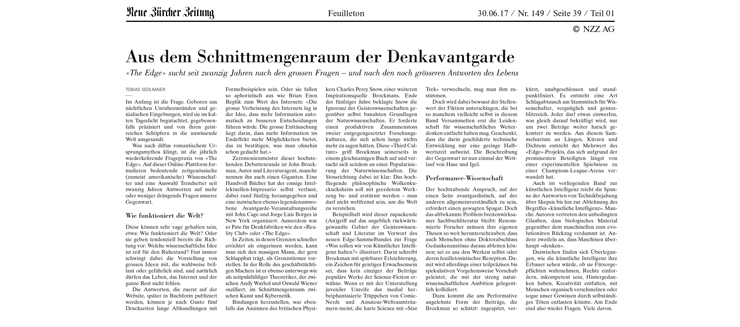Where Avant-Garde Thinking Reflects The Present [1]
Productive Collision
Establishing a dialogue between disciplines was also the intention of British physicist Charles Percy Snow, another source of inspiration for Brockman. At the end of the fifties, Snow bemoaned the ignorance of the humanities regarding even the most mundane basics of the natural sciences. He called for a productive collision of two opposing research cultures, which long had nothing to say to each other.
Brockman, for his part, took up this “third culture” in a book of the same name, and has since sought a popularization of the natural sciences. The direction of his thrust is clear: the neverland of philosophy needs to be entered with robust, down-to-earth tools—you can’t understand the ways of the world from the vantage point of an ivory tower.
Exemplary for this pragmatic sally against the allegedly retrograde discipline of the humanities and literature is the preface of the Edge anthology on the question What Do You Think About Machines That Think? Here, Brockman writes with perceptible relief that none of the essays included invokes popular works of science fiction: he reads this as a sign of intellectual adulthood. If his implicit critique of juvenile immaturity aims at the media-trimmed body of comic-strip nerds and amateur space dreamers who confuse hard science with Star Trek, one may agree with him.
But on the other hand, this attitude consciously eclipses the importance of fiction which may, even for some of the contributors to this volume, have operated as a spark igniting the passion for science; this notwithstanding the fact that the technical developments described in fiction may have but a short half-life period. The attempt to describe the present is, after all, a race of hare against hedgehog.

Performance science
The lofty claim to be avant-garde on the one hand, and generally understandable on the other, requires a risky balancing act. And at any rate, the well-known problem of making scientific literature accessible to a broadaudience remains to be solved: renowned experts have to express their theses in a way that even people without an academic degree can find food for thought—whether from the works themselves or from their reception in the feuilletons. This encourages, however, a semi-precise or speculative approach, which occasionally collides with strictly scientific ambition.
This makes for a kind of slugfest
between scientists, an entertaining
spectacle, full of flashes of genius.
Moreover, there is the performative approach to writing which Brockman so appreciates: pointed, compact, inconclusive, and formulated from the author’s point of view. This makes for a kind of slugfest between scientists, an entertaining spectacle, full of flashes of genius. Everyone can throw in a thought, that might be reaffirmed immediately or harshly contradicted a couple of contributions further in. This smorgasbord of texts, varying in length, shortness and density, constitutes the specific value of the Edge project, which, due to the prominence of the participants, has long since been transformed from an experimental playground into a world class arena.
In the volume about artificial intelligence which now has been published in German translation, the responses range from affirmation to skepticism to rejection of the term “Artificial Intelligence”. Some authors put forth the unconditional belief that biological material is doomed to evolutionary retreat by the progress of high-tech engineering. Others express doubt that machines "think" at all.
In between, there are reflections on how AIs would see their builders, whether they are able to serve as caregivers or to demand rights of their own, whether they are incompetent, have ulterior motives, can develop creativity, merge with people organically or even relieve our conscience by killing autonomously. In the end, therefore, are questions. Many of them.
First published in German by Neue Zürcher Zeitung, June 30, 2017. [2] English translation by: Angela Schader [3]
